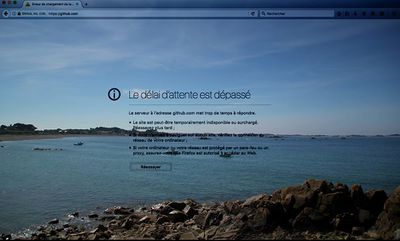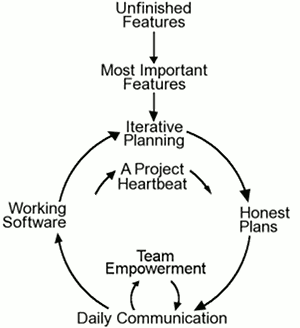IndieCamp/en
Definitions and Principles[modifier | modifier le wikicode]
Objectives of this page[modifier | modifier le wikicode]
- Collectively define what IndieCamp means, what IndiesCamps are, why and how to make IndieCamp yourself and/or several IndiesCamps.
- Document a process
- Document a social code common to these formats and their forks
- Gathering the different documentation of the different IndieCamps
Origins and influences[modifier | modifier le wikicode]
Indie: abbreviation for "independent", sometimes Frenchized as "Indie" or "indep" for "independent", refers to a form of culture produced outside the traditional commercial channels and/or belonging to an underground, non-conformist, avant-garde movement.
The idea behind the creation of the first IndieCamp, named Summer Camp in 2016, came from the desire to have meetings in France inspired by L' indeWebCamp.
The culture influencing the IndieCamp comes from the history of Factory Records, an English independent label founded in Manchester in 1978 by Tony Wilson and Alan Erasmus, which includes in its catalogue several leading bands from the British rock scene of the time, namely Joy Division, New Order, A Certain Ratio, The Durutti Column, Happy Mondays, and (briefly) James and Orchestral Manoeuvres in the Dark. In 1992, the very industrial London Records plans to take over Factory, but the business turns out to be short: in fact, in its early days, Factory used to avoid contracts, and it turns out that New Order's catalogue is largely owned by the band rather than the label. The legend would even have it that the reciprocity frames between the early contributors to Factory Recors were written with Tony Wilson's blood on a piece of paper cloth.
In these origins and influences, IndieCamp is also hoped to be thought of as being designed in a cunning and frugal manner. With reflections and functional attempts that seem like extreme programming. sometimes with use trials of Class, Responsibilities, and Collaboration (CRC) in its design and conduct.
Why and How to "no" organize an IndieCamp[modifier | modifier le wikicode]
Or the secrets and frugal recipe of a third-place (X) ephemeral...
Why ?[modifier | modifier le wikicode]
Let us pledge to meet and reunite whenever circumstances require and separate us only when....
This sentence from the oath of gambling palm (serment du jeu de paume), in which the end is deliberately left suspended for each IndieCamper can write the final goal and that the sum of these writings constitute a set of common circumstance, illustrates quite simply the need for physical encounter of individuals who co-construct this type of format.
This echoes, but is not directly related to Antoine Burret's work, Dr. in sociology: Steps towards a political conception of the third-place.
Thus the choice to conceive the conditions for meeting, living well and doing well together is driven by the need to propose avant-garde formats, hence the use of the term "Indie", which responds to the individual and collective needs of living in accordance with one's convictions, ethical and temporal.
The choice of rural sites for these IndieCamp formats is linked to:
- A desire to decentralise actions and production in the face of metropolitan urban ogres
- Produce intelligent and intelligible, frugal and adapted, non-colonial and appropriable, reproducible and modifiable proof of concept.
- Third-place demands - resilience - self-reliance - digital - are multiplying from individuals or organizations residing in rural and urban areas.
How ?[modifier | modifier le wikicode]
While organizing a 10-day event may seem cumbersome and tedious, there are many ingredients, binders and tips to make it lighter and easier to organize. Preparation time
Before D-day, according to the experience gained, it is necessary:
- 6 months for beginners
- 3 months for acculturated people
- 45 days for seasoned experts
- 30 days for "high-aguerris".
This is not a full-time job but the time needed for discussions, exchanges, collective agreements, and especially the time to inform and motivate individuals to join the process and participate in the camp. See the 2016 recipe "Concevoir Designing and almost non-organizing an Indie camp....".
It is a little indicative time of preparation, cooking, cooking and infusion that is proposed here. It is up to you to conceive with other temporality, especially if you modify the ingredients.
Carrier individuals and groups[modifier | modifier le wikicode]
First of all, it is necessary to form a group of motivated people, or use an existing group, practising a common language or rapidly practicing a common language. This is important to facilitate exchanges while avoiding misunderstandings, sometimes diffuse, of concepts that could lead to a tension strong enough to dissolve the collective momentum and thus the objective of co-constructing and co-realising a Camp. The geographical origins or the distances of residences of individuals in this group are not important, internet can allow to advance in the dialogues by chat or video-conference.
Together, these people, by consensus in this case, establish the basis for the design of the camp:
- Possible slots in the year
- Basic minimum and collective operating conditions to launch the project
- Common Communication Tools and Collaborative Preparation Notes
To organize ourselves and put us into contributory open source and free access to this cellular organization, we used Github and a file in markdown language.
Proof of concept[modifier | modifier le wikicode]
Whether this Proof of Concept (POC) is yours, the Proof of Concept (POC) of others under free license, or whether it comes from a Camp that you experienced but without participating in the organization, it will be beneficial to you to convince hosts to welcome you and will be a trusted agent to convince co-organizers and participants to join you.
In the case of IndieCamp 2017 Névez, the POCs carried out by the co-organisers were :
- Open Source Circular Economy days 2015, 2016, 2017 - 5 jours de hackathon pour chaque année
- Summer Camp 2016 Kerbors
- Open City Lab, les humains et leurs pratiques se collisionnent à Lyon Open City Lab Lyon 2017
- Nuit du Code citoyen Rennes 2017 Recette frugale d'hackathon citoyen open source: en 32 jours et sans budget
- Fork the Wokd à la Biennale du Design de St Étienne 2017
- Rencontre des FabLabs de l'Ouest 2017
</add your POCs>>
Guests and location of the Camp[modifier | modifier le wikicode]
To realize an IndieCamp it is necessary a place allowing experimentation and hospitality. To do so, only the principle of meeting between individuals makes it possible to establish the conditions for dialogue, exchanges and understanding in order to create the conditions of trust between all stakeholders.
Atypical and/or exceptional settings encourage motivation and attractiveness, so it is a factor that encourages collaboration in order not to carry an organization alone or in a very small committee.
Guests and IndieCampers can meet one or more times before discussing the launch of an IndieCamp. Or they can exchange several times by videoconference. These meetings make it possible to find a common language between the parties.
Before taking the action decision, it was the reciprocity framework that was worked out : What Campers owe to the hosts and what the hosts bring to the campsites. Once this reciprocity framework has been established, the only thing left to do is to list the imperatives (or what the parties want or don't want), e. g., what the parties want or don't want:
- maximum number of places
- respect for guests' privacy
- access to electricity and amenities
- Documentation
etc.
The whole being notified in the file .md file in github. You can also use a wiki page to organize yourself if you don't like github.
All you have to do is send the link of your launch and organization documentation to your potentially interested networks and networks. Transparency, reciprocity and open source collaborative practices and the possibility to modify the project / workshop / session program by anyone who would like to participate in the camp provide the conditions for confidence and interest. It is a basis to garden collectively to maintain the transition towards autonomy, well-being and personal and collective fulfillment.
The postures encouraged[modifier | modifier le wikicode]
Hospitality[modifier | modifier le wikicode]
Let us take a pledge that people - of all backgrounds and identities - are welcome, that they feel welcomed in an open and hospitable space. This includes, but is not limited to, persons of any ethnicity, culture, nationality, colour, political belief, religion, mental and physical ability, migration or expatriation status, economic and social class, educational attainment, gender, sexual orientation, gender identity, age, height, family status.
Decorum and well-treatment[modifier | modifier le wikicode]
Let us meet with excellence, that is to say the will and care given to the well-being and happiness of others, and let us make sure that we are well-treated by making sure that our way of acting concretely (knowing how to be and know how) is indeed a field of decorum.
The behaviours we would like to discourage :
- personal attacks: threats, insults, violent language directed against another person ;
- oppressive humour and discriminatory language;
- advances, non-consensual dredging;
- when someone is asking you to stop, don't be a dick;
- encouragement of the above behaviours.
See also Risk Management Issues at Third Party Sites : Questions sur la gestion des risques dans les tiers lieux
Less is more[modifier | modifier le wikicode]
- The desires and possibilities were sourced upstream by videoconference and written online to put anyone interested on the same level of information as the other participants.
- Those who will be there will make the event.
- There aren't really any chief organizers
- Each participant can bear a collective responsibility if it suits them
- Tariff per day is arbitrarily set at a minimum threshold. Financial solidarity among participants was not objected.
DIY :
- you organize yourself, without relying on the non-organizers.
- you honor the law of both feet.
- You know the people here are the right ones.
- Participants come whenever they can, they stay as long as they and she want.
- The participants do not come empty-handed according to their possibilities and their projects
- Everyone's diet is respected and considered before the camp opens
- What emerges from this IndieCamp are the fruits of the common gardens cultivated by the stakeholders
As part of a Third-place[modifier | modifier le wikicode]
Example of documented camps[modifier | modifier le wikicode]
- Carnet de bord InideCamp Kerbors 2017
- Wiki Wiki HackerBeach, hackers at the beach.
Press[modifier | modifier le wikicode]
- Concevoir et presque non organiser un Summer Camp - Xavier Coadic sur Medium
- Les jolies colonies de vacances diy- Makery
- Au Camping de la Bidouille - OWNI

